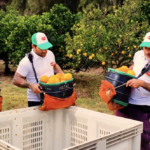Turkish citrus production to decrease 36% due to challenging weather conditions

The ongoing 2024-25 season has proven challenging for Turkish citrus growers, who have suffered from extremely hot weather conditions.
On the Mediterranean coast, where the majority of the country’s citrus production originates, prolonged summer heat and spring-like early winter months adversely affected most citrus orchards.
Coskun Eren, head of marketing for Turkish fresh produce exporter Eren, told Freshfruitportal.com that even though overall production remains close to pre-season forecasts for now, there has been a notable deviation in terms of the expected quality, which led to an increased volume of standard and second-quality produce.
"Along with lower production and concerns about fruit quality, exporters also struggle with high input and production costs," Eren said.
Eren exports different citrus fruits, including mandarins, grapefruit, oranges, and lemons, to more than 60 countries across four continents. It's currently awaiting the harvest and export of late citrus varieties, including Lamas lemons and W. Murcott mandarins. The season is expected to extend into late European spring.
Eren said that Turkish exporters remain strong in international markets, and their strategies have been adjusted to accommodate the evolving circumstances and ensure a steady supply.
"Despite a forecasted decrease of around 30% in orange and lemon production, export volumes are expected to remain almost the same as last season," Eren assured. "As for mandarins and grapefruits, while production volumes are expected to drop by more than 35%, export forecasts indicate a decline of only around 20%."
Current state of citrus globally
Eren indicated that global and EU citrus production will decline in 2024-25, primarily due to reduced lemon production in the EU and Turkey. Additionally, lower orange yields in Egypt, Turkey, and the United States are expected, as well as lower mandarin yields in Turkey and slight declines in grapefruit production in Turkey and the United States.
"As a result, it is an unfavorable season for Turkey's global and EU competitors," Eren said.
On the logistics side, disruptions in the Suez Canal, driven by global geopolitical tensions, caused significant delays, particularly for shipments bound for Asia.
"These extended transit times not only slowed down operations but also raised concerns about preserving the freshness of the fruit during the prolonged journey," Eren noted.
Additionally, rising freight costs added another layer of complexity, making it increasingly difficult to compete in overseas markets, where transportation expenses were already a significant cost factor.
Eren tackles challenging conditions
Despite complicated conditions during the season, Eren said the company acted swiftly and efficiently, thanks to their in-house logistics capabilities.
"With our dedicated fleet of trucks and experienced team, we made timely adjustments to keep deliveries on schedule," Eren said. "This flexibility allowed us to continue providing our customers with high-quality citrus fruits, even in a season marked by logistical and environmental challenges."
The head of marketing said this season taught Eren the importance of being proactive and adaptable.
"By focusing on quality and diversifying our market approach, we successfully navigated these challenges and continued to serve our customers effectively," he said.
Markets for Turkish citrus
Turkish citrus continued to enjoy strong demand across a wide range of markets this season, although the reactions and performance varied significantly from region to region, Eren indicated.
In Russia, which remained Turkey’s largest market, exports stayed relatively stable despite a slight decrease in demand. This decline was primarily driven by fluctuations in the ruble, which influenced buyer behavior and purchasing decisions.
"Even with these financial uncertainties, Turkish citrus maintained a solid presence in Russia, thanks to the strong preference for our mandarins and lemons in the region," he said.
Europe presented a mixed picture. Poland stood out as a success story, with citrus imports from Turkey growing significantly—up by 50% over the past five years. This increase reflects the growing trust in Turkish citrus in the Polish market.
On the other hand, some markets in Eastern Europe experienced a temporary slowdown in demand due to economic challenges and logistical hurdles. Also, Western Europe maintained a strong interest in Turkish mandarins.
The Middle East remained a stable market for Turkish citrus, with countries like Saudi Arabia and the UAE maintaining consistent import levels despite rising geopolitical turbulence.
In Asia, demand for Turkish citrus continued to grow, driven by consumer appreciation for its unique flavor and quality
"However, the Suez Canal crisis created significant logistical challenges, extending transit times and increasing shipping costs. Despite these issues, the interest from Asian markets remains promising for future growth," Eren assured.
Projections for Turkish citrus industry
Eren said the future of Turkish citrus production will largely depend on weather patterns, market dynamics, and logistical challenges.
"If weather conditions return to more normal patterns and the extreme adversities we faced this season do not repeat, we expect higher yields and better fruit quality in the upcoming season," he indicated.
Additionally, if disruptions in the Suez Canal ease, access to Asian markets could improve as demand in these regions grows.
"Competition from major citrus-producing countries should be closely monitored, as we foresee competition from Egypt and Morocco continuing, especially in the European and Russian markets," Eren concluded.













































